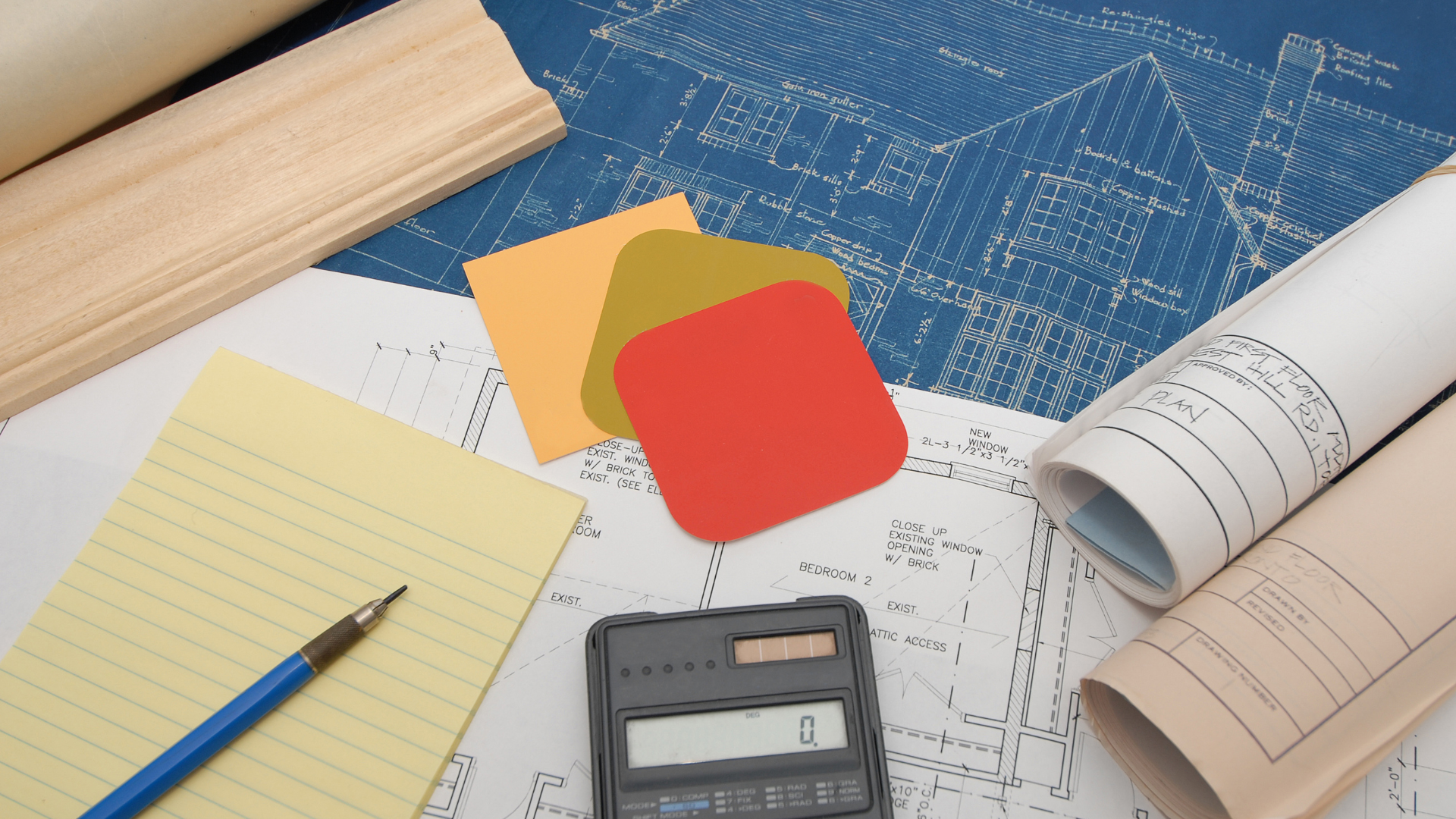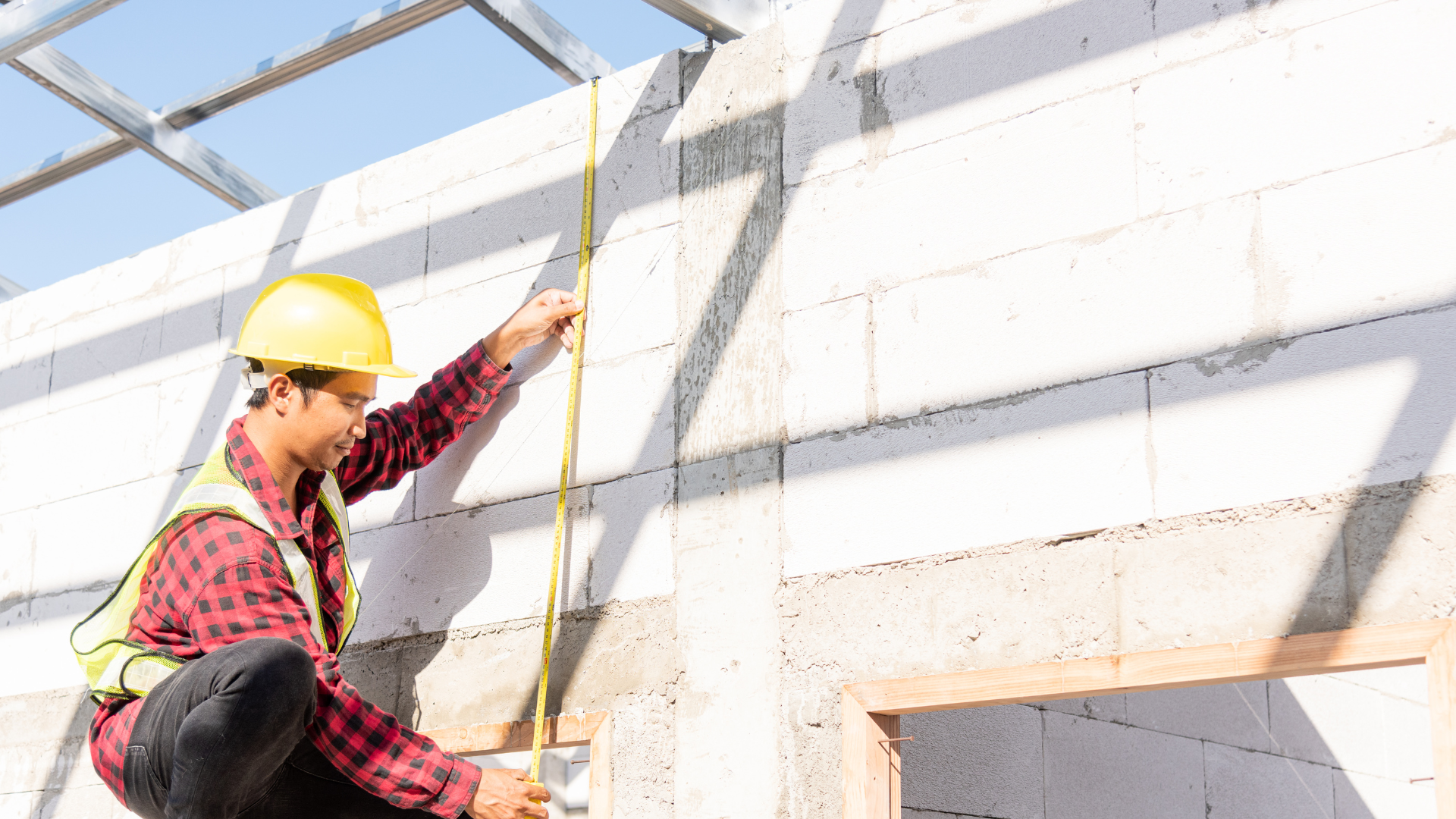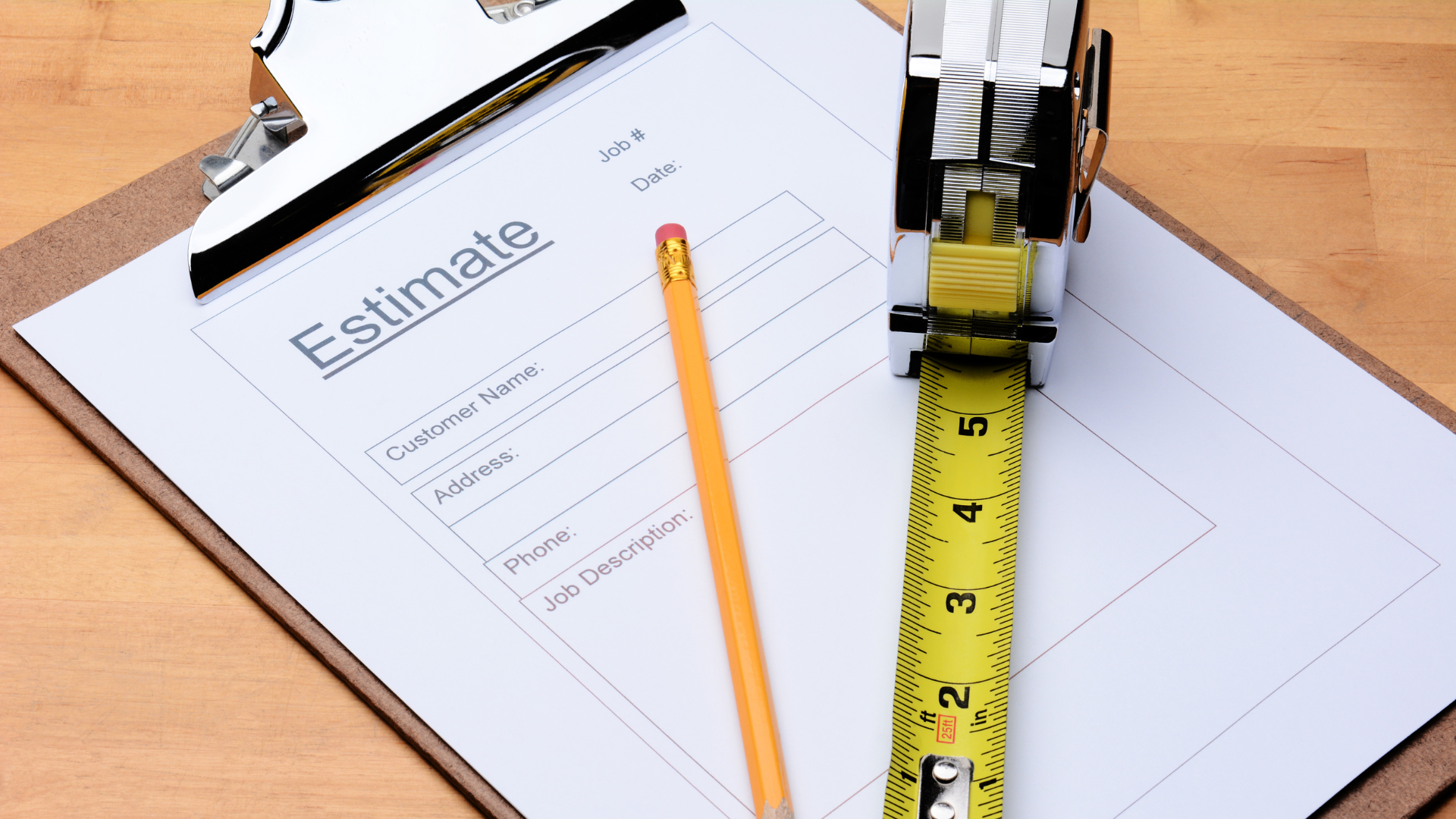August 18, 2025
Audio overview: Listen & Learn
Your Roofing Business Runs on More Than Nails and Shingles. Think about your last few weeks:
- Missed a customer follow-up?
- A crew showed up at the wrong address?
- Still chasing that final payment from three jobs ago?
If any of this sounds familiar, the problem may not be your team. It might be your tools.
As your roofing business grows, even by just a few jobs each month, things start to pile up: job data, customer calls, estimates, material orders, invoices, and follow-ups, and spreadsheets or generic apps just don’t cut it anymore.
However, a solid CRM (Customer Relationship Management) tool designed for roofing contractors can be the difference between chaos and clarity. But here's the catch: not all CRMs are built for the roofing industry, and choosing the wrong one can cost you time, money, and trust.
7 Mistakes Roofers Make When Choosing a CRM for Roofing Companies
The data regarding CRM implementations is alarming. According to Gartner, the failure rate stands at 50%, whereas Forbes estimates it could reach between 55% to 75%. Other organizations, including Harvard Business Review, CSO Insights, and the Merkle Group, have also reported comparable results.
This challenge is encountered across all industries, particularly among mid-sized to small companies, and the roofing industry is no exception. So, what goes wrong?
To answer this, let's further explore in the blog:
- Why your CRM decision can either fuel growth or create chaos?
- What should you avoid when choosing roofing CRM software?
- How to pick the best CRM features for your team?
Key Takeaways:
- Choose a CRM designed specifically for roofing workflows, such as aerial measurements, weather delays, and crew dispatch, rather than a generic CRM for other industries.
- Ensure it offers mobile access so crews, sales teams, and managers can update jobs, estimates, and photos from anywhere.
- Use one with integrated invoicing, financing, and cash flow tools to track payments and avoid revenue gaps.
- Focus on essential features you’ll actually use, while ensuring the CRM can scale as your jobs, crews, and customers grow.
- Choose a user-friendly platform with strong reporting so your whole team adopts it quickly and you get clear insights to boost margins.
What Is a Roofing CRM and Why Does It Matter?
A roofing CRM software is a central hub that manages the entire customer journey, from capturing leads to scheduling jobs, sending estimates, processing payments, and follow-ups. It brings all your tools, like estimating, billing, photo uploads, and customer data, into one easy-to-use platform.
Instead of switching between email tools, photo apps, and spreadsheets, a CRM integrates everything. With features like analytics dashboards, mobile apps, and numerous integrations, it helps streamline your roofing services, improve team coordination, and eliminate double data entry.
So, whether it’s roof replacement or quick repairs, a CRM ensures your roofing projects run smoother, faster, and more profitably.
Why Roofing CRM Isn’t Just Another Tool But Your Sales Lifeline
- Your roofing CRM isn’t just a place to store customer information; it’s the engine behind your entire sales process.
- From the moment a new lead comes in, your CRM should help you qualify it fast, assign it efficiently, and move it smoothly through estimating, project management, ordering materials, and billing processes, all without juggling multiple systems.
- In a trade where jobs are won (or lost) over a single phone call or delayed quote, the right roofing software ensures you’re never flying blind.
- It replaces repetitive tasks with automation, connects the field and office in real-time, and provides visibility into the status of each job and where money is slipping through the cracks.
- If you’re still piecing together other tools or spreadsheets to manage roofing sales, you’re not just wasting time; you're leaking revenue.
- An all-in-one tool with the right CRM product features isn’t a “nice-to-have” anymore. It’s your unfair advantage in a crowded market. Miss it, and you’re left playing catch-up.
Also read: Roofing Business Reports You Can’t Ignore in 2025
Why It’s Crucial for Small to Mid-Sized Roofing Companies
Smaller roofing companies don’t have time or resources to waste. A CRM reduces manual work, improves internal communication, and lets your roofing team focus on what matters most: closing deals and keeping customers happy.
With the right CRM, you can:
- Instantly capture leads on-site or online.
- Automate routine tasks and email marketing.
- Sync customer interactions across tools.
- Track materials from vendors like ABC Supply.
- Monitor team performance with built-in analytics.
The result? More deals, more sales, and better use of your time, without hiring more contractors. If you're serious about scaling smart, the best roofing CRM platforms help you grow your roofing business and keep your systems sharp.
Must read: Roofing Workflow Automation | Streamline Your Business
What are the 7 Common Mistakes Roofers make while choosing a CRM?
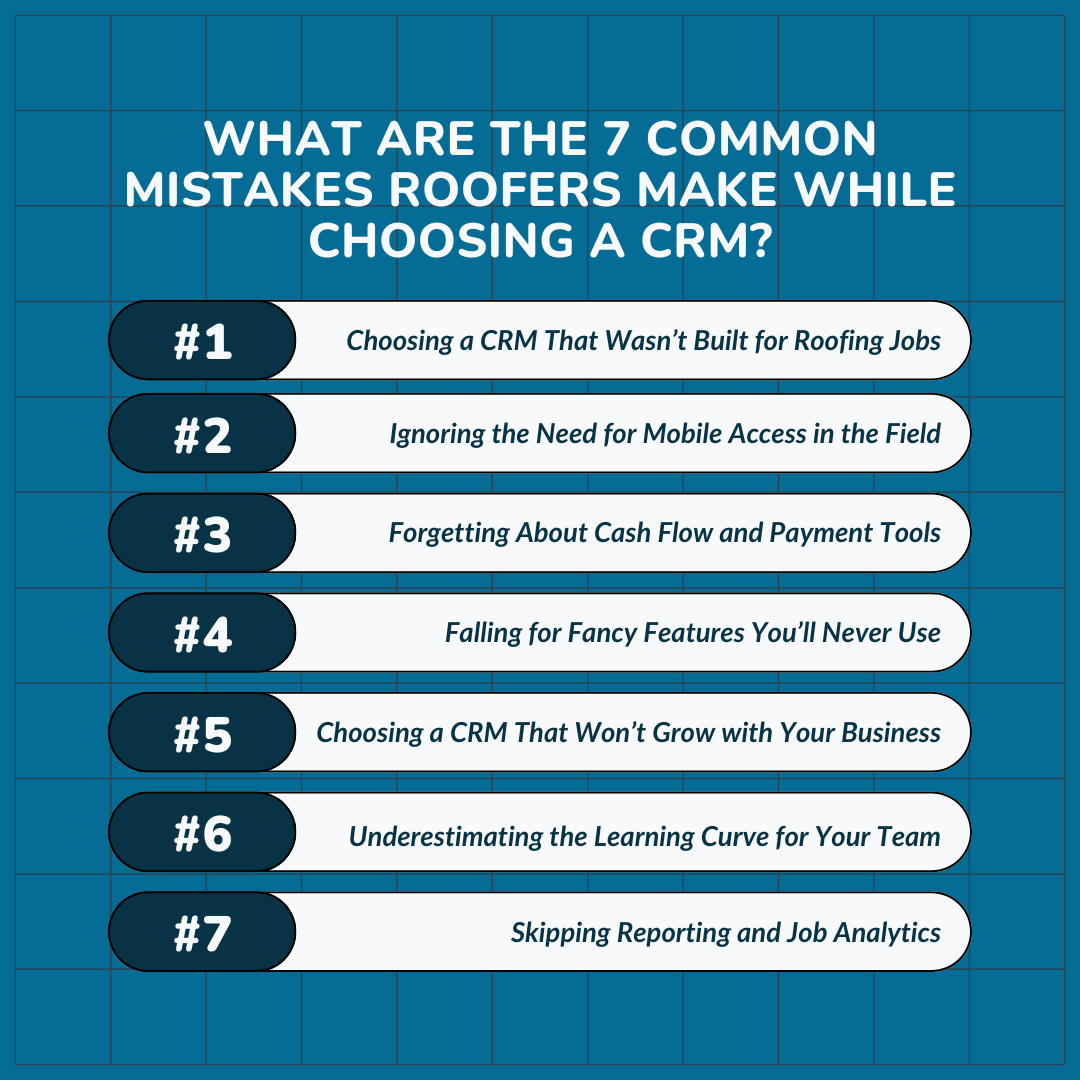
Many roofers rush into CRMs that look good but fail on the job. These seven mistakes often lead to lost leads, wasted time, and stalled business growth:
#1. Choosing a CRM That Wasn’t Built for Roofing Jobs
- Many roofers settle for generic CRMs made for retail or real estate, not roofing.
- That means no aerial measurements, no weather delay tracking, and zero roofing workflows.
- You end up changing your process to fit the tool, instead of the tool adapting to your crew.
Tip: Look for a CRM with specific features made for roofing contractors, not generic sales teams.
#2. Ignoring the Need for Mobile Access in the Field
- Your sales team and crew aren’t tied to desks; they’re on roofs and job sites.
- If your CRM doesn’t work smoothly on mobile, you’re inviting delays, miscommunication, and rework.
- No one should have to drive back to the office to update a lead or upload images.
Tip: Choose a CRM that lets your team access everything on the go, from job updates to estimates.
#3. Forgetting About Cash Flow and Payment Tools
- No roofing business can survive without smooth billing. It's crucial to avoid work stoppages and keep crews paid on time.
- If your CRM doesn’t handle invoices, financing options, or payment reminders, you're stuck using spreadsheets or juggling third-party tools.
- That’s time lost, payments missed, and a higher risk of delayed projects.
Tip: Get a CRM with accounting software or integrations that help you track payments and save time chasing cash.
#4. Falling for Fancy Features You’ll Never Use
- Shiny dashboards and hundreds of automation options may look good in a demo, but they won’t fix your scheduling or job delays.
- Too many tools confuse your team, slow down onboarding, and lead to frustration.
Tip: Stick with a CRM that offers essential features you’ll actually use: job tracking, scheduling, estimates, communication, and billing.
#5. Choosing a CRM That Won’t Grow with Your Business
- Today, you might handle 5 jobs a week. Next year, it could be 25, and if your CRM can’t scale with your growth, it will quickly become a bottleneck for your business
- If your CRM can’t scale to manage more jobs, users, or crews, you’ll have to switch platforms mid-growth, which is an expensive and painful process.
Tip: Make sure your CRM supports new features and multiple users as your company expands.
#6. Underestimating the Learning Curve for Your Team
- A CRM is only useful if your team actually uses it.
- If it feels like learning to fly a plane, your crew will quickly abandon it for faster but less efficient workarounds.
- Complex dashboards and tech-savvy tools are ineffective for fast-moving roofing teams.
Tip: Look for tools that are simple, intuitive, and designed for both office staff and on-site crews, even those who aren't tech-savvy.
#7. Skipping Reporting and Job Analytics
- If your CRM only stores contacts and jobs, you’re missing half the picture.
- You need data to answer: Which crews finish fastest? Where do your qualified leads come from? How long does estimating take?
Tip: Pick a CRM that gives you reporting features to spot bottlenecks, track performance, and boost profit margins.
Take a look at this for a practical guide: Integrating Roofing Software into Your Daily Operations: A Guide
What to Ask Before Choosing a Roofing CRM
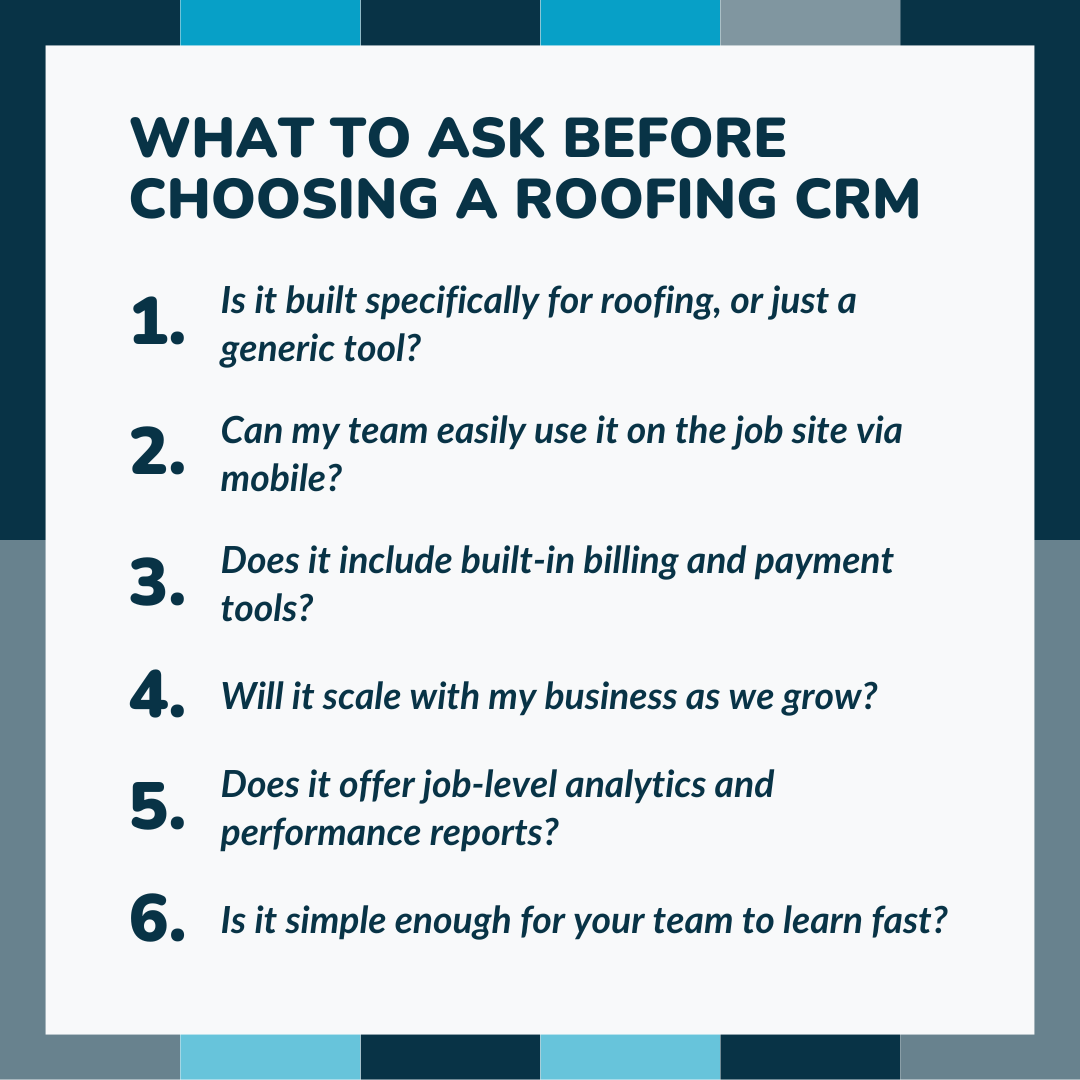
Not all CRMs are built for roofers. Ask the right questions to find a solution that fits your workflows, scales with your team, and simplifies your day-to-day operations.
1. Is it built specifically for roofing, or just a generic tool?
Generic CRMs lack roofing workflows, such as aerial measurements, material tracking, or storm maps. Make sure it’s tailored to the way roofers work, not retail or real
estate.
2. Can my team easily use it on the job site via mobile?
Your crew works on roofs, not behind desks. Thus, the CRM should work smoothly on phones/tablets, allowing instant updates, image uploads, and communication from anywhere.
3. Does it include built-in billing and payment tools?
Look for features like digital invoicing, financing options, and payment tracking to avoid juggling spreadsheets or chasing unpaid bills manually.
4. Will it scale with my business as we grow?
Today, it might be 3 crews; next year, 10+. Ensure the CRM can support an increased number of users, jobs, and features without necessitating a complete platform switch.
5. Does it offer job-level analytics and performance reports?
You need data to improve crew performance, job timelines, and lead sources. Ensure the CRM provides customizable dashboards and reporting tools.
6. Is it simple enough for your team to learn fast?
If it’s confusing, they won’t use it. Prioritize intuitive, clean interfaces that even non-tech-savvy team members can pick up quickly with little training.
Why RooferBase Is a Smart Choice?
At RooferBase, we’ve talked to hundreds of roofing business owners who struggled with bulky, generic CRM systems. So we built something better, designed specifically for roofing.
Here’s how we tackle the mistakes that others make:
- Built for Roofing, Not for "Everyone": Every feature in RooferBase was shaped by actual roofing pros, with workflows that fit the job, not force you to change your process.
- Mobile-First Design: Crews and managers can access everything they need, from scheduling to job photos, using their phones or tablets.
- Integrated Financing and Payment Tools: Track invoices, send reminders, and stay on top of your cash flow in real time.
- No Fluff, Just Tools You Use: We don’t overload you with gimmicks. Just practical, job-ready features like crew coordination, aerial measurements, and material order tracking.
- Scales as You Grow: Whether you’re running 3 jobs or 30, RooferBase is built to handle it.
- Easy for the Whole Team: Simple onboarding, intuitive design, and clear support make it easy to get everyone on board.
- Real-Time Analytics That Drive Action: From sales pipeline status to job cost breakdowns, our dashboard shows you what matters, fast.
Conclusion:
The Right CRM Won’t Just Help You Stay Organized, It’ll Help You Grow Confidently!
Choosing a CRM is one of the most important software decisions a roofing business can make. Get it right, and your operations run smoother, your customers stay happier,
and your margins improve.
You don’t need a tool packed with every feature; you need the right features designed specifically for your business and tailored to the people doing the work.
So, whether you're booking 3 jobs a week or gearing up for major growth, the right CRM saves you time, protects your profits, and helps your team succeed.
About RooferBase
RooferBase is purpose-built CRM software for small to mid-sized roofing companies. From lead capture to payment processing, we help you manage every stage of the job in one place. No fluff. No fuss. Just tools that work.
See how RooferBase can book you more jobs, cut admin time, and get you paid faster. Explore here and start winning more roofing contracts today!
FAQs
Q: Can RooferBase work for multiple locations?
A: Yes. RooferBase supports roofing businesses with multiple job sites and teams.
Q: Is training required to get started?
A: No formal training is required. We designed the platform and all the tools to be user-friendly for both office staff and field teams.
Q: Can I manage financing and billing within RooferBase?
A: Absolutely. RooferBase integrates payment processing, invoicing, financing, and estimating tools to help manage cash flow efficiently.
Q: What makes RooferBase different from other roofing apps?
A: Unlike general CRMs, RooferBase is designed specifically for roofers. Every additional feature is purpose-built to address real roofing business custom reports and needs.

